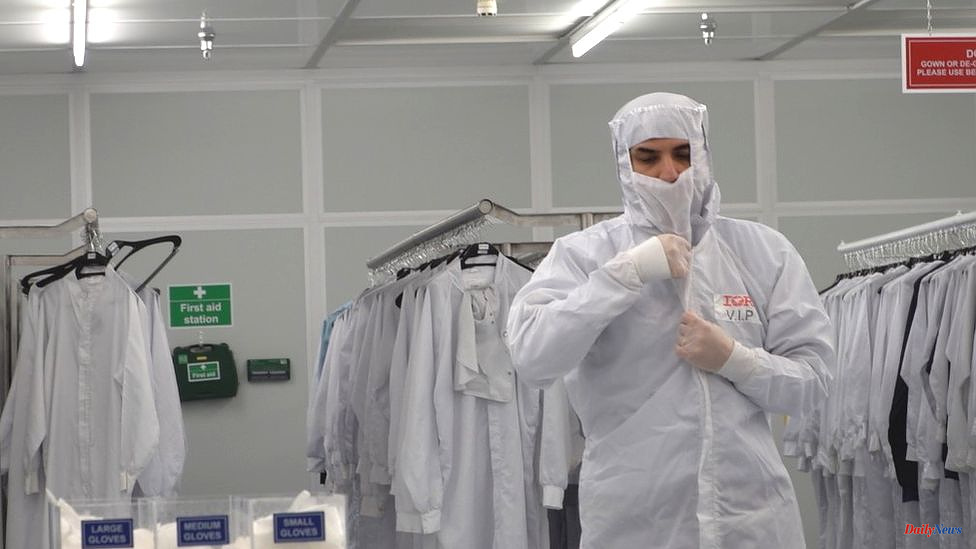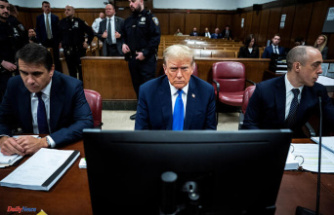It is an extraordinary experience to enter Newport's manufacturing plant. Before you can step into the chamber, where air blasts away contaminants, gloves, white suits and hoods must be worn in the correct order.
A guide explained that the process is not designed to protect people but the product. The secure door is surrounded by the UK's largest semiconductor manufacturing plant, which is 100 times more clean than an operating room in a hospital.
Ghostly white suits-clad men in suits transport pods on trolleys. Photosensitive material is applied to silicon wafers that are extracted by robotic arms. To print the pattern on the chips, light is projected onto the wafer. Semi-conductors, also known as microchips and chips, are what you end up with. They are the basis of much modern life.
Mary Curtis, who has worked at the site for over three decades, says that every silicon semiconductor product begins with a grain or sand. She explains that the Newport plant's high-volume output ends up in cars all around the globe as well as white goods such as washing machines.
Although Newport has been in operation since the 1980s, it was thrust into the spotlight to be an unlikely front-liner in a new battle between China and the West.
Nexperia bought Newport Wafer Fab last July after it was in financial trouble. Nexperia's headquarters are in the Netherlands, but its ultimate owners were Wingtech Technology, a Chinese company.
Alarm bells were triggered by this.
Martijn Rasser, a former CIA analyst who is now a senior fellow at Center for a New American Security think-tank, says that China's prominence in the global semiconductor market is not in the United Kingdom's strategic interest.
China has had a difficult time in semi-conductors, a crucial technology area. Washington took advantage of this and restricted supplies to Chinese telecoms company Huawei. This caused it great pain. China wants to catch up and decrease its dependence.
This means that the UK has had to sell its largest facility to Chinese owners. Mr Rasser says that Congress and Washington will "lean heavily" against the acquisition.
However, alarm bells didn't initially ring in the UK government. The National Security Adviser conducted a review, whose conclusions are still unclear. Ministers ordered a new national security review in May. This was just a year ago, after the sale and after much lobbying. This review, unless extended, is expected to take place soon and could lead to the cancellation of the purchase.
These are difficult issues.
National security concerns do not concern highly sensitive technology that is made at the site for a defense or intelligence purpose. It is not about relying on chips from overseas.
Tom Tugendhat (Chair of the Foreign Affairs Committee), who opposed the sale, says that "we do need to build our own domestic resilience like the US is doing, and as the European Union [is] doing]." We need the building blocks to make it possible. Newport Wafer Fab is an example of one such building block.
Newport does not produce the most advanced semiconductors. These semi-conductors are found in Taiwan, and it is very expensive to catch up. It can cost up to PS10bn ($12bn), to build a state-of-the art fab. Even this price does not guarantee that you will be able to maintain a leading edge. Some wonder if the UK has the resources and will to invest at such a high level.
Newport, if it does, is all it needs to continue building on. It also created a local tech cluster.
Nexperia believes that being part of a global company is essential. It submitted to a parliamentary panel that Nexperia had helped the UK's semiconductor industry to be healthy.
The plant has support for the takeover. The Chinese acquisition gave job security to 500 workers and promised modernization after a period in uncertainty. One employee said that the future was not looking bright.
Newport's future is at the core of a larger question: What is the government’s overall China strategy? How does the government balance Chinese investment and security risks? Despite talk of divisions between security-focused and growth-focused people, there has not been a clear policy.
The final stage of the imprinted wafer process takes place in the sterile fabric. They are then carefully examined for any impurities. The UK has managed to keep a rather messy policy regarding Chinese investment for years. Now, however, it appears that this is becoming more difficult.












